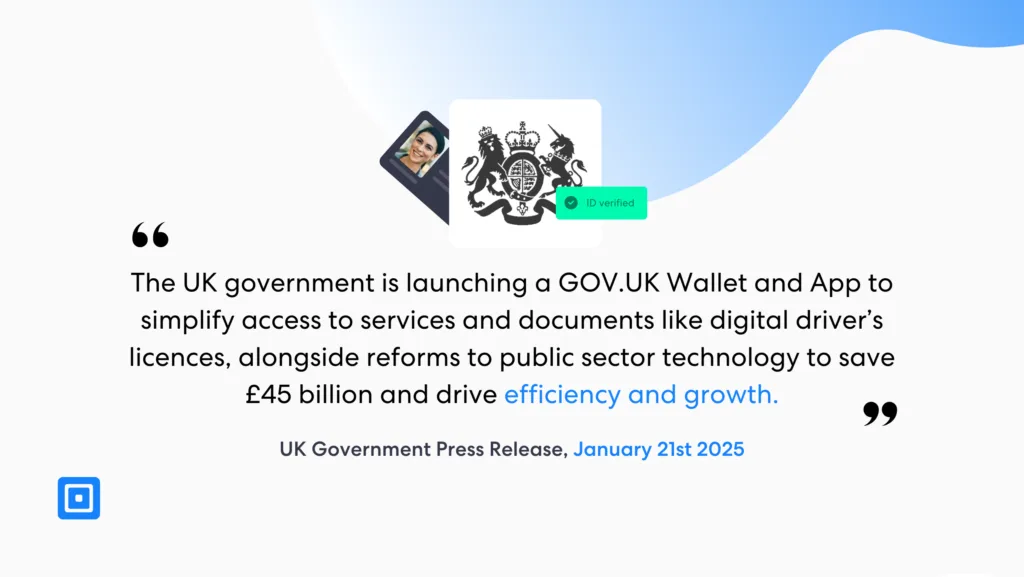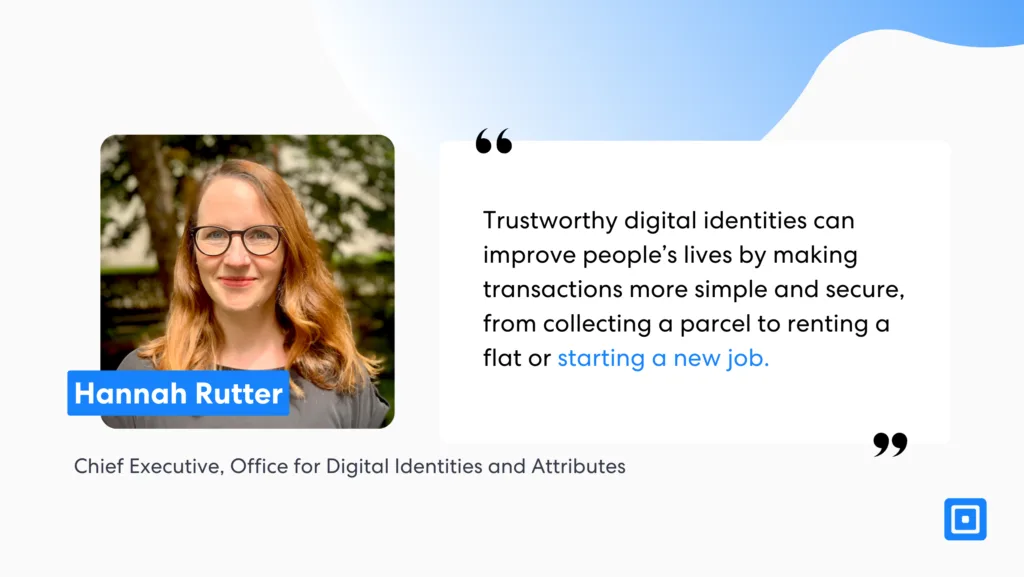A new UK digital wallet is set to be introduced in Britain in 2025, enabling UK citizens to hold digital identification documents, such as driving licenses, on their mobile phones. This implementation will drastically simplify everyday transactions, reducing the need for physical documents and providing enhanced security. Whilst the app will not be able to replace passports, which will be needed for international travel, digital identification will become the norm within domestic identification processes. The introduction of this wallet is part of a much wider movement towards efficiency by embracing digitization. However, participation is voluntary, and some have voiced concerns regarding potential future mandates and data protection. This guide will dive into how digitized documents may change the UK’s identification processes and how this will play into KYC and AML national and international mandates.
What is a Digital ID?
A digital ID refers to a digital version of an individual’s identification documents, which can be securely stored and accessed through a smartphone app. Digital IDs serve the same function as physical documents, such as driving licenses, but are convenient and secure as the app utilizes advanced smartphone security features. Facial recognition can be used to protect personal data, making it far more difficult for fraudsters to access or manipulate an identity document. Additionally, the app will allow for immediate access to identity documents, reducing the possibility of theft or loss that might occur with a physical document.
Increased Security with a UK Digital Wallet
The UK’s new digital wallet app will help reduce the risk of identity fraud in several key ways. By allowing individuals to hold critical documents digitally, the app can leverage biometric security checks using facial recognition to ensure accurate biometric verification. This means that if a fraudster successfully stole someone’s phone and held their digital documents, the fraudster could not use these documents to commit identity fraud. Additionally, with fewer physical documents circulating, the risk of fraudulent use of IDs is also minimized. Apart from the threat of identity fraud, the digital format also ensures that identity information stays up-to-date, further preventing the potential for fraud using outdated or forged documents.

Harnessing Technology for the Greater Good
The UK Government has created an expansive blueprint for how the Department for Science, Innovation and Technology (DSIT) will now house a revamped Government Digital Service (GDS). Using the Digital Service is planned to save taxpayers £45 billion in efficiency savings, which is part of the government’s “Plan for Change.”
The UK government is launching a GOV.UK Wallet and App to simplify access to services and documents like digital driver’s licences, alongside reforms to public sector technology to save £45 billion and drive efficiency and growth.
The Government’s “Plan for Change” also includes ending hospital backlogs, securing home-grown energy, raising living standards, building 1.5 million homes, supporting children, and putting increased police officers in place. With several new public-sector objectives, such as these, the Government must respond to the rapid advances in technology and leverage them to enable seamless operations at scale. Rt Hon Peter Kyle MP, Secretary of State for Science, Innovation, and Technology, states, “We’re still a long way from building a truly digital state – one where services work across institutional boundaries, and where digital credentials enable a more timesaving, personalized user experience. It’s not enough for government to just ‘keep up’ with the scale of change happening all around us. We have to understand it, use it, and shape it. And we must grasp every opportunity to drive greater value for money for the taxpayer.”
We’re still a long way from building a truly digital state.
The GDS blueprint highlights that the government will “harness the power of AI for the public good. ” One of the first steps towards this form of digitization will be the mobile driver’s license. This will allow citizens to prove their age from their phones in shops or online.
Trustworthy digital identities can improve people’s lives by making transactions more simple and secure, from collecting a parcel to renting a flat or starting a new job.
In speaking with the UK Government’s Office for Digital Identities and Attributes, Hannah Rutter, Chief Executive Office for Digital Identities and Attributes, stated that “trustworthy digital identities can improve people’s lives by making transactions more simple and secure, from collecting a parcel to renting a flat or starting a new job. These faster and more secure checks can create huge efficiency savings for businesses. Subsequently, the use of secure digital identities could generate £701 million per year in economic benefits in the UK.”

Introducing the Mobile Driver’s License
The UK government’s launch of mobile driver’s licenses is expected in 2025 as an initial step within the new GDS. This mobile driver’s license will allow people to store and use it securely on their smartphones, making it easier to prove their age when buying age-restricted items and verify their right to drive. The digital license will be one of the first government-issued documents available in the wallet, which will use advanced security features like facial recognition to ensure safe access. Piloting will begin in 2025, with the full rollout expected by 2027, alongside other government credentials like Veteran Cards.
The government is reportedly exploring the possibility of incorporating additional services into the app, including tax payments and benefits claims. Other forms of identification, like national insurance numbers, may also be included. However, it is unlikely that physical identification will be completely replaced.
The Importance of Accurate Identity Verification
Accurate Identity Verification is crucial as the UK adopts digital IDs, especially for industries like finance and healthcare. Digital IDs can streamline KYC processes, enabling faster, more secure identity checks. This improves customer experience and reduces fraud risks. For AML compliance, digital IDs enhance transaction tracking and suspicious activity detection.
While the benefits are clear, challenges remain around cybersecurity and privacy. The government must ensure robust protections and address data-sharing concerns, especially as digital IDs expand to include more services like medical records or academic credentials. Balancing convenience with privacy will be essential to maintaining public trust as the system evolves. Ultimately, the move to digital identification promises greater efficiency but requires ongoing security measures and public dialogue to be successful.
For more information on the importance of secure Identity Verification, get in touch with one of our compliance experts.




